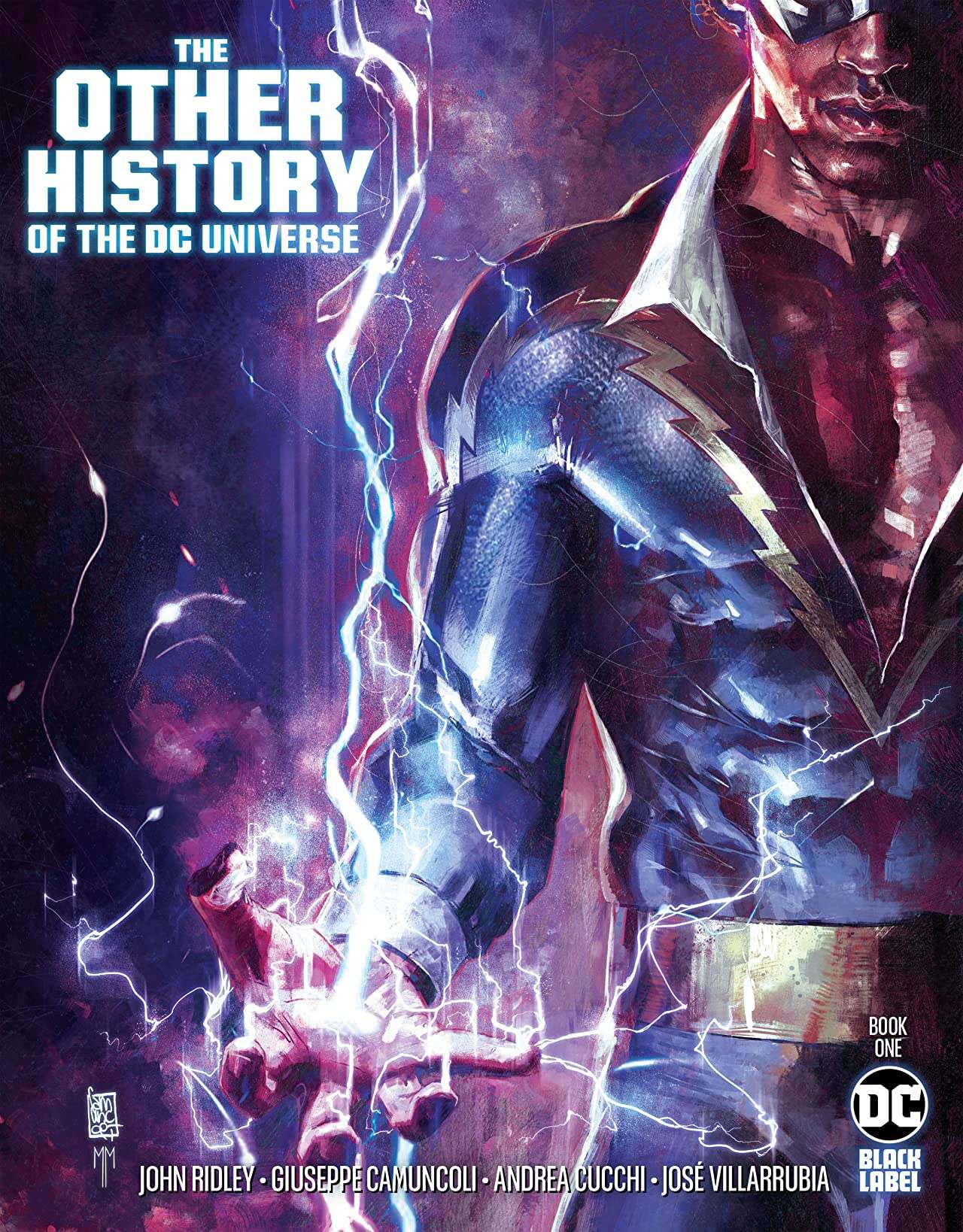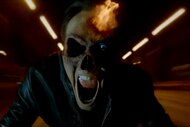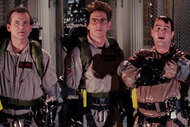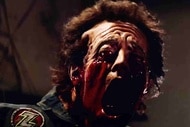Create a free profile to get unlimited access to exclusive videos, sweepstakes, and more!
'We want to inspire people': John Ridley on The Other History of the DC Universe

The first issue of The Other History of the DC Universe, the new DC Black Label series launching this week from writer John Ridley and artist Giuseppe Camuncoli and Andrea Cucchi, makes it very clear that the word "history" is there for a reason. The five-issue series is inspired, in part, by the two-issue History of the DC Universe series from Marv Woflman and George Perez published in 1986, and as a result it's a detailed, expertly crafted walk down DC Comics memory lane.
If you're familiar with the major events of the DC Universe, you'll see a lot of them pop up again and again in this version of the story, in which Ridley -- who's been at work on the project for years -- attempts to filter those key moments through the perspectives of various DC characters from "traditionally disenfranchised" groups. But as Ridley set out to tell the story, beginning with the perspective of Black Lightning himself, Jefferson Pierce, he also wanted to make sure that those major events were much more than signposts along the road.
"What was more important to me, rather than just drop these events into history, and say 'Oh, this happened, this happened, this happened,' [was to] really try to examine them from the perspectives of these characters," Ridley told members of the press, including SYFY WIRE, at a roundtable event ahead of The Other History's launch. "Some of these events, we may see more than once, and the characters comment on them. Some of the views of the characters represent different views of same, similar moments in history.
"So it was less, to me, about just putting in obelisks on a timeline, and saying, 'This happened, and this happened, and this happened,' but more importantly, how did these events... how are they contextualized, how are they absorbed, how are the meanings expressed to the lead characters in each one of these stories, if that makes sense. [It's] less about just revisiting a big event, and saying 'Hey, everybody remember when Superman died? Great, let's move on,' but more about how their character's saying 'Wow, I'd always thought this about Superman, but when we lost him, I had to re-examine how I felt, or what it felt to the larger universe, if the universe was real. What happens when we lose a really remarkable individual? Maybe they had a troubled past, maybe we felt differently about them, but that loss, how do we collectively about it, in that moment?'"
The Other History of the DC Universe #1 gives Jefferson Pierce a lot of space to contextualize several key events in DC Comics history and in world history as he attempts to navigate his early life as a young athlete, his early days as a teacher, and his rise in the superhero community at a time when there aren't many Black superheroes surrounding him. All the benchmarks are there, from his early battles with The 100 to his time with the Outsiders to his relationship with heroes ranging from Superman to Green Lantern John Stewart. For Ridley, that meant revisiting some of the Black Lightning comics he grew up with, and reexamining how he sees the character now through the pages of The Other History.
"For me, looking back on these Black Lightning stories, as much I enjoyed them, I really began to see more of a reflection of men that I knew, and so there was a desire for me, within that storytelling, to go back, and put context to why Jefferson was a little bit more intractable in some of his beliefs," Ridley explained. "His world view was a little less malleable than maybe some other characters, but then ultimately [I wanted to] make sure that, in places, you saw him become aware of that.
"So, for me, it was, and with all of these characters...[was really about] excavating that humanity. In all of the comic universe, there's somebody who can run fast, and somebody who's bendable, and somebody who can make heat beams come out of their eyes. But what makes these characters indelible, are their own stories, and the artists and artisans in the history of comic books, who've made these characters very particular. So, for me, I wanted to... When I started going back into these stories, and I saw particular natures, I wanted to lean into that, I really wanted to explain that, and then I wanted to reconcile that, and show that you can be particular, but you can still have emotions. And again, particularly, to Black men. We don't get to see that enough. Black men just being human, being people, and having emotions, and positive emotions, love, and crying, and empathy, and all of those things."
All of those emotions run throughout Jefferson Pierce's story, but The Other History of the DC Universe doesn't begin and end with Black Lightning. In issues to come we'll see the perspectives of everyone from Renee Montoya to Tatsu Yamashiro (aka Katana) to, in the second issue, the couple that is Karen Beecher (aka Bumblebee) and Mal Duncan (aka Herald/Guardian). That meant not only changing perspectives for Ridley between issues, but in some ways, changing tone to reflect how those characters came up in this fictional universe.
"In issue two, well, there is still some tough storytelling, some very tough things from the '70s... Teen Titans, back in the day, their stories were really progressive. If you have not gone back and looked at some of those stories, they're hyper-progressive, so there's tough stuff that's going on, but I did want it to be a little lighter. I did want it to be about a young, black couple, who are in love, and committed to each other, and figure it out, and find a way. So it's a dual perspective, it's a lighter perspective, it's a couple's perspective, it's teens' perspective, about hyper-otherization, beyond just being black or female.
"Teens are... they're always trying to find themselves. They're always trying to figure out 'How do I fit in?' There's stuff about bullying, even within the Teen Titans. They don't realize how they're talking to each other, and based on real things that were said, in some of these books, so the perspective is a couple's perspective, a little bit lighter, a little bit more fun, but definitely leaning into young people trying to figure out who they are in the world."
Though he was always in the scripting driver's seat, Ridley has spoken before about the need to seek outside perspectives and input on many of these characters who don't share his own background in the same way that a character like Jefferson Pierce does. When asked about the importance of those perspectives on the finished work, Ridley offered an answer that's about what he hopes is the larger purpose of the series as a whole. It's called The Other History of the DC Universe because it focuses on characters who aren't the straight, white defaults whose histories we've already seen before, but it's also called that because, by spotlighting the characters he chose for this story, Ridley hopes to reach out to others and invite as many people as possible into this world.
"To me, the most important thing... on the one hand, you always never want to, whether it's intentionally or unintentionally, write something that's just, particularly in the world we live in, that's just patently offensive. But even that, even if you're just careful when you're writing something that, to most people, you're always going to write something irrespective of the character, people are going to love it, they're going to hate it. But even if you're writing something where you're being very careful, and being very responsible, more than just 'Oh, hey great, we wrote this, we didn't offend anybody,' we want to inspire people," Ridley said. "And the reality is that when you create something, there is an implicit invitation for other people to join in. To join in with their time, to join in with their money but hopefully, more than anything, that, at some point, they'll join with their talent.
"Back in the day, Tony Isabella, a white man, wrote Black Lightning. I don't know why. I don't know if he wrote it because he looked at the landscape, and said there're not enough characters of color. I don't know if he wrote it because DC said 'We'll pay you a couple extra bucks,' but Tony did this, and he had no idea that he was speaking to an eight-year-old kid, back in the day, saying, 'You can do this.' And Tody did the best that he could. I mean that sincerely. I mean that truly, sincerely. Anybody can look at that work, particularly anything written in the '70s, and go 'Oh, it should've been more this, or it should've been more that.' All I know is, one of the reasons that I'm here, one of the reasons I'm doing any entertainment, at all, is because of guys like him who said 'You know what? If you enjoy this, why shouldn't you be part of this?'
"So I hope, more than anything, and in the exploration of going to other people, and saying 'Hey, check my work, and check it honestly,' that, beyond doing everything we can to not be offensive, that the most important thing we do, is that we're being inspirational, to anyone and everyone, to say 'Hey, come and be part of this, in any way you choose.'"
The Other History of the DC Universe #1 is on sale Tuesday.


























